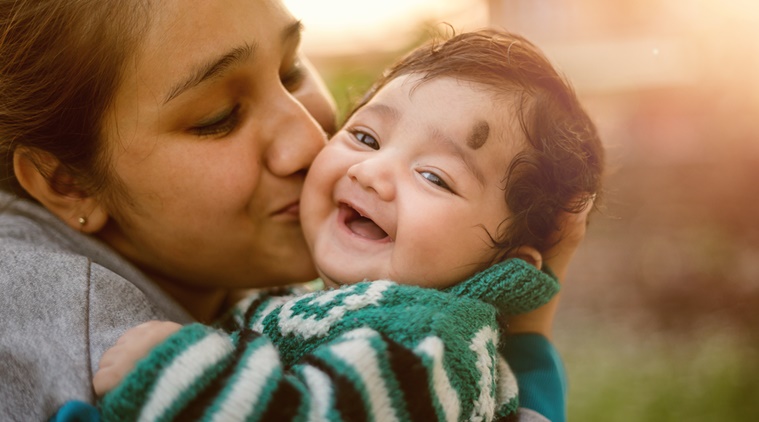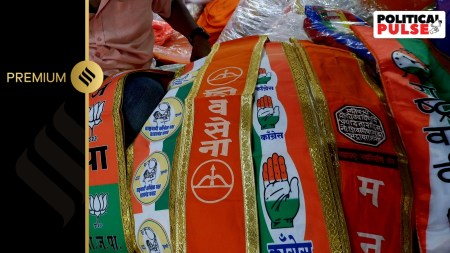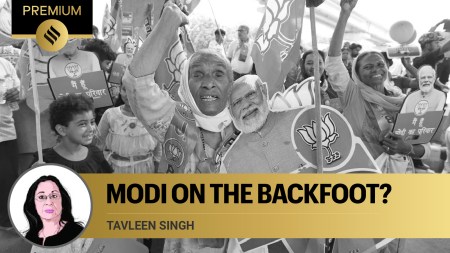- India
- International
Why narratives around motherhood in India need to involve postpartum depression
Postpartum or postnatal depression is a mental condition associated with childbirth, manifesting within a couple of weeks after the delivery. While the condition could affect both the sexes, more women are reportedly prone to depression in child-bearing years.
 Mental health continues to be highly stigmatised in India, thus stopping people from reaching out for professional help. (Source: Getty Images)
Mental health continues to be highly stigmatised in India, thus stopping people from reaching out for professional help. (Source: Getty Images)
“My doctor rushed my delivery and manipulated it in a way that my only option was going for a caesarean section surgery, because she had to go on a vacation. I cried for a month while struggling to bond with the baby after this,” says Lijo J Daniel, a 29-year-old mother. She was 25 when she had her first baby. For Nitya Kumar*, who lives in the Netherlands, it was the fact that she was doing so many things on her own. “Taking care of a baby, writing my thesis, cooking, cleaning — with the body-image issues that new mothers have” — all at the same time, made motherhood a testing phase for her, she says.
What triggers postpartum depression, or PPD, can vary widely. It could range from worrying if the baby is eating too much or too less to lack of emotional and/or financial support for the mother in taking care of the child, distressed relationships and even, domestic violence.
Mental health continues to be highly stigmatised in India, thus stopping people from reaching out for professional help. This, coupled with an exciting phase like motherhood, in which the mother is dealing with a newborn, with hormones throwing a curveball every now and then, and battle body-image issues, PPD is easily confused with ‘postpartum baby blues’.
In India, research shows how a lot of factors leading up to PPD are also largely socio-cultural in nature, with one of the most prevalent being the desire for a male child.
What is postpartum depression?
Postpartum or postnatal depression is a mental condition associated with childbirth, manifesting within a couple of weeks after the delivery. While the condition could affect both the sexes, more women are reportedly prone to depression in child-bearing years. In addition to the hormonal and physiological changes that the mother goes through, excessive and uncontrollable crying, anxiety attacks, difficulty in establishing a secure bond with the newborn, insomnia or sleeping too much, loss of appetite or binge-eating, feeling inadequate as ‘ideal’ mothers, are some of the obvious symptoms of PPD. And in extreme cases, thoughts of harming self and/or the baby or suicidal tendencies might develop in new mothers.

What makes reaching out for help difficult?
 Too many cases of postpartum depression go unreported because the focus shifts from the mother to the baby after the delivery. (Source: Getty Images)
Too many cases of postpartum depression go unreported because the focus shifts from the mother to the baby after the delivery. (Source: Getty Images)
“An Indian woman in my neighbourhood committed suicide a little into motherhood and her family, amidst the joy and excitement of welcoming the newborn, thought ‘she had seemed like her usual self,” says Anjuli Singh, a 24-year-old student of medicine who lives in Toronto, Ontario in Canada. She was formally introduced to PPD in her second year at the university. Realising how not much emphasis is laid on clinical depression following childbirth, Singh took it upon herself to spread awareness about the gravity of the condition and collaborated with SOCH (Supporting Our Community’s Health), a mental health awareness-raising organisation on a project sensitising people about PPD.
Dr Rinku Sengupta Dhar, gynaecologist at the Sitaram Bhartia Institute of Science and Research, asserts that while postpartum blues are more commonly reported, not many women seek medication for postpartum depression. “Out of the, say, 700 delivery cases we undertake annually, only about five mothers diagnosed with PPD reach out for medical help. The numbers in the records are that low,” she says. This, however, surely does not reflect reality. “Too many cases go unreported because the focus shifts from the mother to the baby after the delivery. So even when mothers face physical exhaustion, weakness and an overall lack of physical and mental well-being, it tends to go unnoticed, not just by the family members, but even by the mothers themselves,” she says. Taking forward from that, Anna Chandy, one of India’s leading counselling experts and the chairperson of actor Deepika Padukone’s ‘The Live Love Laugh Foundation’, told indianexpress.com over email, that the family members’ empathetic approach towards the mother and her baby will make her battle with PPD easier than otherwise.
Both Daniel and Kumar found a great support system in their family members. Daniel, who would never mull over a problem too much, found herself crying incessantly and, sometimes, even blaming her baby without reason for an entire month. She realised she was projecting symptoms of PPD from the book “What to expect when you are expecting” that she was reading around the same time. Kumar’s post-delivery exhaustion was accentuated because of the “second degree vaginal tear” while giving birth to her child. “I was stitched up and the pain was excruciating. I could not move. I remember telling my husband in the initial few days that I did not want to live anymore. It was that bad. This, coupled with a baby that needs you more than anything else. Even breastfeeding hurt. I did not know that could be so painful too,” she says. While Daniel found herself slowly healing after a month because of the care and sensitivity around her, Kumar, along with that essential factor has confided in therapy to see “where it goes”.
“It is important to also note that postpartum depression cannot be cured by family members trying to counsel the mother, because PPD is an illness and not just a whimsical thought,” Chandy added.
Stressors of PPD in India
In South Asian countries, especially India, the reasons for PPD are largely associated with socio-cultural dimensions along with biological risks, Nandita Bhan, who is a research scientist at Center on Gender Equity and Health, University of California, San Diego and Teertha Arora, a researcher in the Boston Consulting Group and intern with the Public Health Foundation of India, found in their 2016 research. “In particular, we found gender of the infant, a preference for sons, distressed relationships, lack of social or emotional support, socioeconomic or financial difficulties and experiences of violence as important factors associated with PPD,” Bhan told indianexpress.com in an email interview. “Some of these factors may be more commonly seen among poorer households as compared to rich, but that need not be necessarily true either,” she adds. Underlining how the symptoms are overlooked in the chaotic changes that motherhood brings in more often than not, Bhan said that when formerly a report based on their survey was published, their network of friends realised they faced symptoms similar to PPD, but “did not know that their condition had a name or who to reach out to”.
 A preference for sons, distressed relationships, lack of social or emotional support, socioeconomic or financial difficulties and experiences of violence were found as important factors associated with postpartum depression in Indian mothers. (Source: Getty Images)
A preference for sons, distressed relationships, lack of social or emotional support, socioeconomic or financial difficulties and experiences of violence were found as important factors associated with postpartum depression in Indian mothers. (Source: Getty Images)
PPD and treatment
About 13 per cent of women who have given birth experience a mental disorder, worldwide, while in developing countries it increases to nearly 20 per cent. While National Mental Health Survey of 2015 estimated that new mothers affected in India ranges between 15.3 per cent and 23 per cent, the National Policy for Women drafted in 2016 emphasises on a more dedicated screening of and treatment for women’s mental health issues in primary healthcare services.
According to Bhan and Arora’s research, the interventions for treating PPD must include a holistic approach that also focuses on the socio-cultural stressors and not just the biological causes. An NDTV report states that about two in 10 women are prone to depression after childbirth in India. However, there are still not enough mental health professionals who could approach women’s mental health in tandem with ensuring their physiological wellness.
According to Chandy, family members play a key role in facilitating medical help or psychotherapy for new mothers. “They could provide this assurance by sharing responsibilities with the mother, by keeping a close watch on the mother’s well-being because she herself might tend to overlook her mental health while taking care of the baby,” she says.
Dr Dhar insists that while psychotherapy might be helpful, if the condition continues, it is imperative that they get medical help. A mother’s well-being (or the lack of it) affects not just herself, but on the newborn solely dependent on her — yet another reason why mental health should not be discussed in confused, hushed tones but with more transparency.
More Lifestyle
May 14: Latest News
- 01
- 02
- 03
- 04
- 05


































